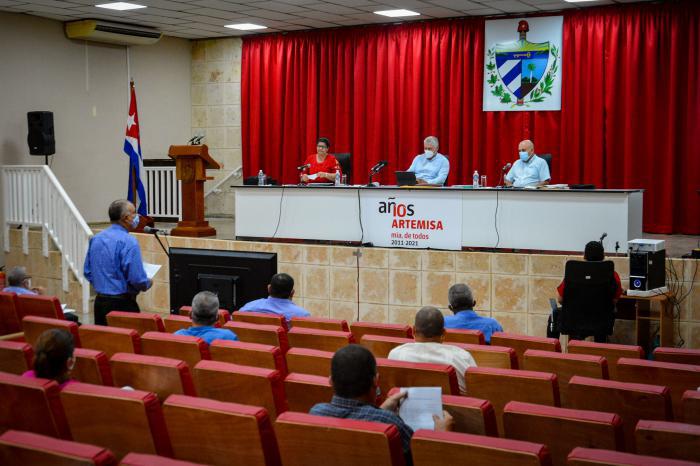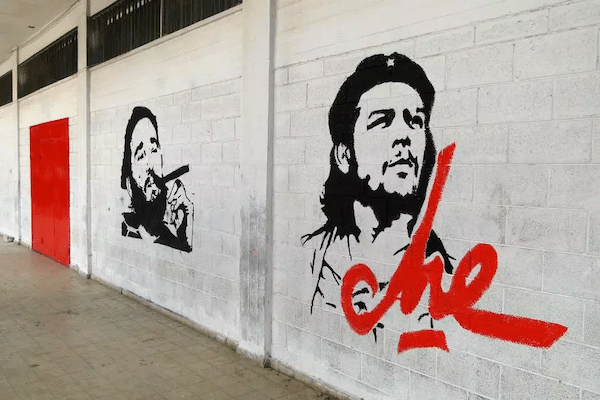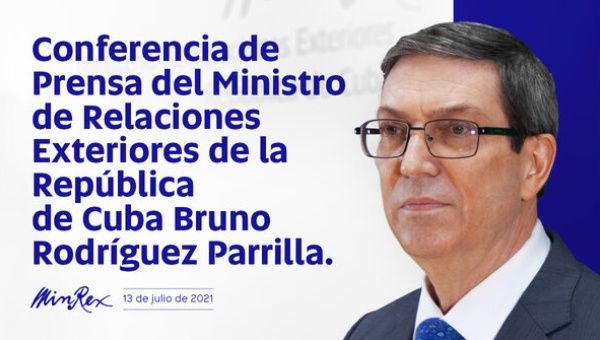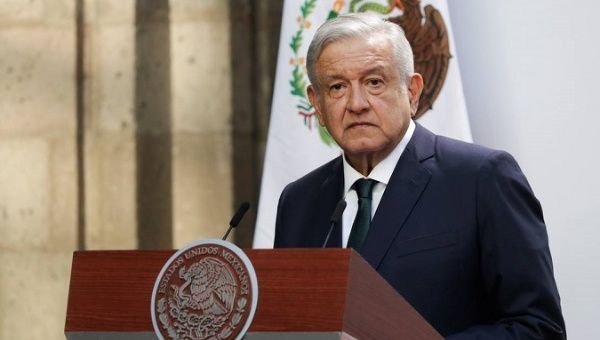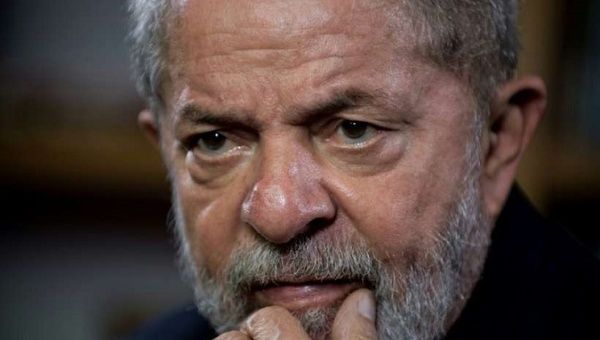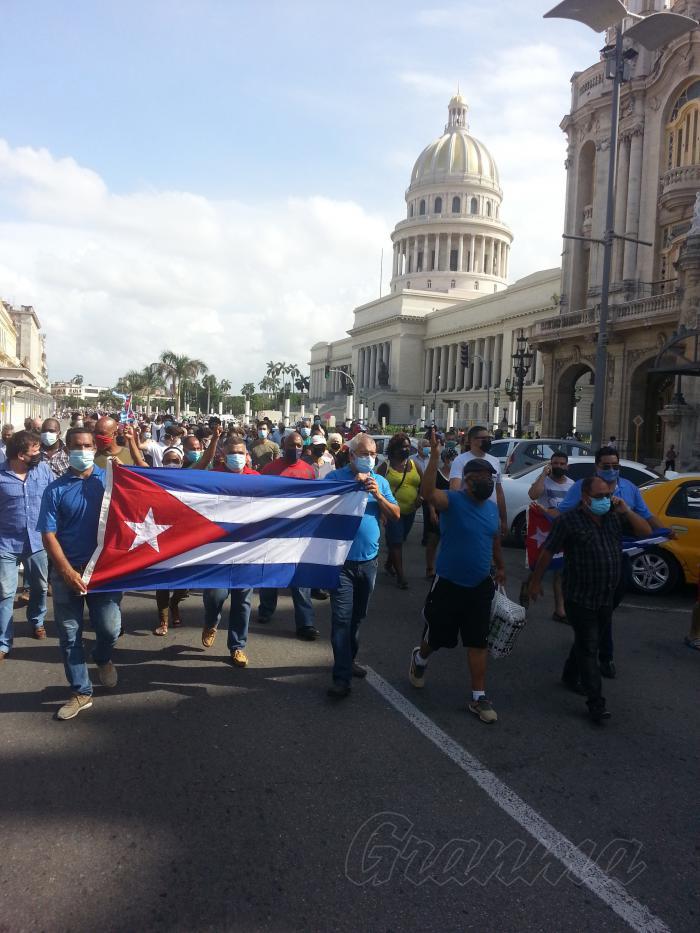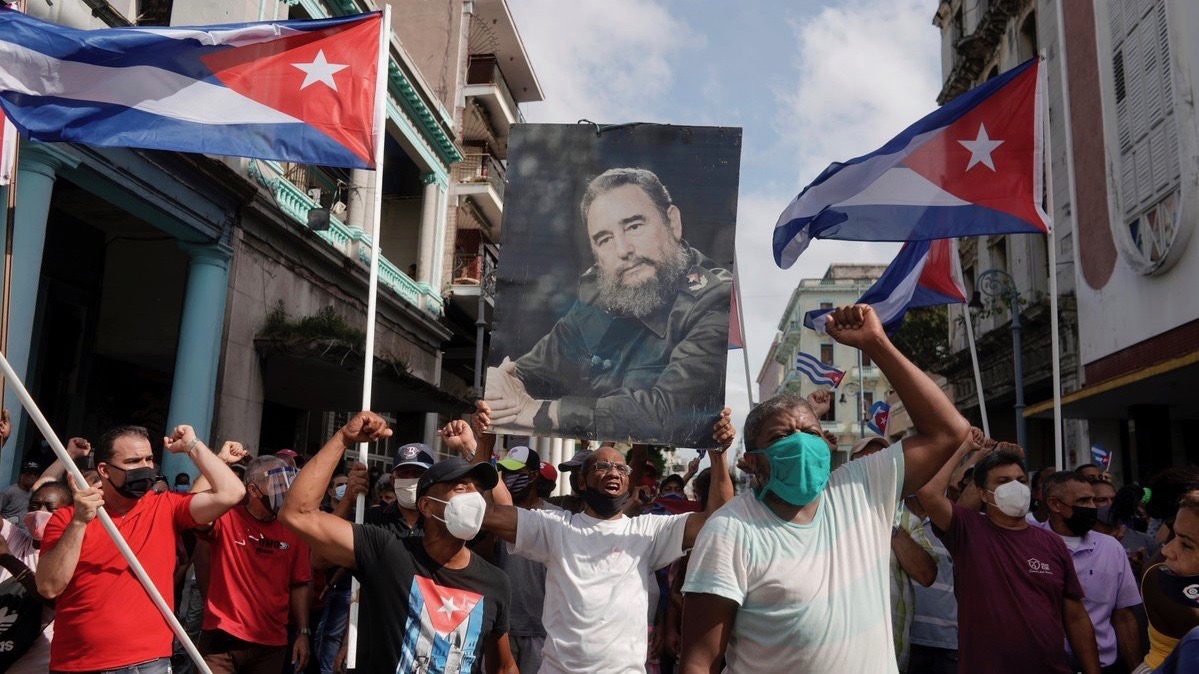What is happening in Cuba? (+ Video)
"We are calling on all the revolutionaries of our country, all the communists, to take to the streets in any of the places where these provocations are going to take place today, from now on and in all these days," said the President of Cuba. Yesterday
Author: Yisell Rodríguez Milan |
yisell@granma.cu
Author: Yaneidy Abreu |
internet@granma.cu
Author: Yudy Castro |
castro@granma.cu
Author: Yenia Silva Correa |
internet@granma.cu
Author: Lisandra Leyé del Toro |
internet@granma.cu
Author: Ricardo Alonso Venereo |
internet@granma.cu
July 12, 2021 07:07:40
9:00 am CHECK ALL COVERAGE HERE
http://www.granma.cu/cuba/2021-07-12/en ... este-lunes
Live: Government of Cuba addresses the people this Monday morning
Accompanied by a team of officials and executives of the Party and the Government, the First Secretary of the Central Committee of the Party and President of the Republic, Miguel Díaz-Canel Bermúdez, began his appearance with a greeting to the people of Cuba who this Sunday starred in a conference historical defense of the Revolution.
He commented that since the middle of last week they had decided that a group of colleagues, linked to the tasks of confronting the pandemic, would provide extensive information to our people. That is the objective of this appearance.
Likewise, during the meeting it is intended to clarify a group of matrices that, in recent hours, they have tried to impose, as well as actions of discredit on the ways in which Cuba faces the pandemic, with the purpose of creating discontent and fracturing the unity of the town.
LIVE VIDEO HERE
https://www.facebook.com/CanalCaribeCub ... %2CO%2CP-R
-------------------------------------------------- -------------------------------------------------- ---------------------------------------
8:30 am PROVINCE BY PROVINCE, SUMMARY OF YESTERDAY'S DAY
The network of correspondents of the Granma Newspaper moved throughout the national territory. The full report can be read here .
Guantanamo: From the first anti-imperialist trench in Cuba, cadres of the Party, the Union of Young Communists, the organizations of the masses and unions, representing the people of Guantanamo, took various points of the city of Guaso to ratify that, in effect, the streets are of the revolutionaries.
In the midst of the difficult epidemiological situation in the province, the masses and authorities of the Upper Cuban East prevailed the voice and the desire to defeat the common enemy, now COVID-19, but also the unbreakable decision to never allow anyone to demerit the effort that the country makes to preserve lives.
"I had to be and I was, no one can tell me, they did not achieve what they wanted, we continue to be a trench as is all of Cuba," said citizen Niurka Garzón Cuevas, who together with a representation of workers, militants of the PCC and of society civilians staged an act of patriotic reaffirmation this afternoon in the José Martí de Guantánamo park.
The call for unity, the rejection of vandalism and blockade, as well as the message of hope and of taking care of all of us transcended, both at the points where counterrevolutionary rallies were attempted, and from the networks.

Live: Cubans, throughout the nation, at the call of the Homeland and its President (+ Video)
Santiago de Cuba: Strong proof of this support took place in Palma Soriano, when, upon learning of what happened in that city, the Commander of the Revolution Ramiro Valdés interrupted in Songo-La Maya his visit to support the confrontation against COVID-19 to exchange with the palm trees, and as soon as he broke into his glorious olive green uniform he was acclaimed by the people.
"As if by magic," Gilberto Romero Sauder, the coordinator of government programs in the province, testified, "that went from the rudeness of the small group of leaders to the ovation of the vast majority of people (undoubtedly many confused) who spontaneously gave cheers to Fidel, to Raúl, to Díaz-Canel, and of course to Commander Ramiro Valdés ».
Together with the highest authorities of the Party and the government in the province, Lázaro Expósito Canto and Beatriz Johnson Urrutia, Valdés Menéndez then joined the act of revolutionary reaffirmation staged by hundreds of people from Santiago who spontaneously gathered in front of the headquarters of the Provincial Committee of the Party , in the vicinity of the central Plaza de Marte, in this city.
Granma: «We have come out to defend the truth and reason of a country that despite being blocked put the lives of its people first in the face of the pandemic and today has its first vaccine; the same country that cares for the elderly as well as for children and that does not leave anyone helpless ", said, for his part, the renowned artist José Alberto" The Nightingale.
Like them, other people from Granma have also come to guard their workplaces and block any attempt at cheap vandalism.

In pictures: The people in the streets defending the Revolution
Yaima Pérez Pérez, a worker at the Comercial Bayamo store, said that more than a duty it is a commitment of each revolutionary not to let them try to harm the Revolution's conquests.
"I am not alone taking care of my job, I am taking care of the future of my children, their tranquility and their happiness because I want them to continue living and growing in a sovereign nation," he stressed.
Hundreds of Bayamo people also arrived at the Rotunda located on 26 de Julio Avenue, in Bayamo, reaffirming with songs, slogans and flags the premise that Cuban independence is neither sold nor negotiated.
Holguín: The revolutionaries located in front of the headquarters of the Provincial Committee of the Communist Party of Cuba, were violently attacked with stones by many of those who claimed a minute before that it was a peaceful demonstration to express some disagreement.
However, the stones did not intimidate the comrades guarding the building and at the opportune moment, together with the forces of order, they undertook self-defense actions before which the aggressors withdrew.
This was followed by an act of revolutionary reaffirmation in which the National Anthem was spontaneously sung in a vibrant call to combat so as not to allow the adversary to take the initiative away from us in the severe conflicts that lie ahead due to his insistence on subverting the social order.
Those gathered expressed support for the Communist Party and the President of the Republic, Miguel Díaz-Canel, at the same time that they demanded the end of the economic, financial and commercial blockade of the United States against Cuba.
Las Tunas: The silence in the streets of Las Tunas was broken this Sunday afternoon when groups of young people shouted in chorus "With Díaz-Canel pa'lo que se! », After the First Secretary of the Central Committee of the Communist Party of Cuba and President of the Republic of Cuba, Miguel Díaz-Canel Bermúdez, summoned the revolutionaries to defend the Homeland.
At the time of writing this note, in most of the municipalities of Las Tunas the people, especially the young people, marched through the main avenues with flags and posters demonstrating their unrestricted support for the Revolution. From balconies and rooftops the applause and fiery voices of those who do not allow themselves to be manipulated by the hate and discredit campaigns against our country were heard.
Camagüey: The attempt to subvert the institutional order in this legendary city by groups of stateless people, counterrevolutionaries and criminals of all kinds received the energetic response of the people, together with the forces of the Ministry of the Interior, permanent watchdogs of citizen tranquility.
At the call of their masters and payers of crumbs, those who wanted, with their actions, to break the unity of the Cubans, and for this, in their desire to provoke a social outbreak, they threw stones and other blunt objects at the mass of workers and law enforcement officers who impeded their advance.
Camagüey experienced a new test of unity this Sunday, in which the National Anthem was heard louder than ever and the flag of the lone star waved with special beauty. From a point not far away, El Mayor watched the good Cubans, machete in hand.

San Antonio de los Baños: «Pa 'whatever Díaz-Canel is! Pa' whatever it is!» (+ Video)
Ciego de Ávila: A radio address by the highest authorities of the province was enough so that, spontaneously, the people gathered around the Martí Park, the scene where Carlos Luis Garrido, first secretary of the Party in the province, called to fight those who tried to subvert order.
The march was not crowded, but it was the people's response, Julio Gómez Casanova, first secretary of the Party in the municipality of Ciego de Ávila, acknowledged just an hour later.
«Defending the Revolution is defending the future. We have to be calm, prepared and alert, because they are being manipulated, "he said in clear reference to those who allow themselves to be managed by spurious interests.
Sancti Spíritus: A tour of Granma in the late evening hours through the center of the provincial capital, a city of just over 100,000 inhabitants, found the people of Spiritism talking from the door of their house and commenting on the intervention of the First Secretary of the Central Committee of the Party and President of the Republic, Miguel Díaz-Canel Bermúdez, on the recent events reported in some parts of the country.
Faced with specific provocations in the main city and in Trinidad, the people and the social organizations at the forefront did not take long to express their support for the Cuban social project and in particular the government of President Díaz-Canel.
Cienfuegos: Up to the time of writing this note, reaffirmation acts and marches had taken place in three populous neuralgic points of the city: San Carlos Street, Reina's working-class neighborhood, and Martí Park.
In this place, in the heart of the Historic Center of Cienfuegos, the member of the Central Committee and the first secretary of the Party in the province, Maridé Fernández López, called on the people of Peru to make their own and support the premise given by our President: revolutionaries. And not from the mercenaries, some answered.
Villa Clara: The provocateurs and instigators of hatred forgot a detail when choosing one of the stages to orchestrate the demonstration in the capital of Villa Clara. They did not take into account that the street they walked on is called Independence, a sacred word for worthy Cubans, who are the majority in this country.
The hundreds of Santa Clara residents who came out to that artery to respond with the dignity that characterizes the children of the land of Marta Abreu and El Che, the confused in good faith and the mercenaries who want nothing more than annexation, did remember the sacred definition that names that street, where the bust of Ramón Leocadio Bonachea, son of this town, who starred in the Protest of Hornos de Cal stands.
Pinar del Río: Only in the provincial capital, spurred on by the counterrevolution that follows orders from the United States, a small group of people tried to concentrate on Alameda Avenue around 4:00 pm, with calls for chaos and civic disobedience .
Faced with an unusual event in this city, incited from abroad through social networks, the people of Vueltabajo immediately gathered in the place, to cut off the provocateurs and reaffirm that the streets belong to the revolutionaries.
Between flags and slogans, people from Pinar del Río from all sectors expressed their support for this great work that since 1959 began to transform the life of a province that until then was considered the Cinderella of Cuba, due to its alarming rates of poverty.
-------------------------------------------------- -------------------------------------------------- ---------------------------------------
7:30 am SUMMARY OF WHAT HAPPENED ON THIS SUNDAY'S DAY IN CUBA
This Monday, at 9:00 am, the First Secretary of the Central Committee of the Communist Party of Cuba and President of the Republic, Miguel Díaz-Canel Bermúdez, along with members of his government team, will appear on Cuban television and radio in joint transmission.
*E printed diting of the newspaper Granma on Monday 12 July 2021 (download here)
http://www.granma.cu/file/pdf/2021/07/1 ... 071209.pdf
*Full speech by the President of Cuba this Sunday: We defend the Revolution above all
http://www.granma.cu/pensar-en-qr/2021- ... 1-01-07-22
*What happened in San Antonio de los Baños?
http://www.granma.cu/cuba/2021-07-11/an ... in-vacilar
*They faced the revolutionary provocations near the National Capitol
http://www.granma.cu/cuba/2021-07-12/po ... 1-01-07-54
[youtube]
https://youtu.be/_D8QlNr8pVY[/youtube]
-------------------------------------------------- -------------------------------------------------- ---------------------------------------
INTELLECTUAL OPINIONS
Rolando Pérez Betancourt, film critic and columnist for Granma: The country needs help, as others needed it before, with the aggravating circumstance that we are in an economic situation worsened by the blockade, those seven letters of funeral intentions, which many fight lightly of a stubborn who does not understand, or does not want to understand.

Sincere hearts, no tricks
Helping the other, selflessly, is the most beautiful reverence that can exist, and Cuba has examples to fill the pages of a newspaper.
Receiving international aid to get ahead in this tense moment is therefore not a shame, and hopefully the shipments that allow us to meet our needs will skyrocket.
But conditioning "humanitarian aid", manipulating it with crude revanchist intentions, linking it to campaigns aimed at creating a chaos of survival among those who today need not tricks, but sincere hearts reaching out, lowers the human condition to limits that, once the crisis has passed. storm, they will hardly be forgotten.
Victor Fowler, poet, essayist, critic, narrator: A process of social change like ours is an inordinate experiment in the creation of a new culture (of work, of solidarity, of participation) that is obliged to discuss itself all days.

The mistake I didn't make
It is to deploy new ways for permanent communication between the leaderships and all sectors of the population, either through the misaligned use of the mass media, through the actions of political organizations or through that instrument of massive scope and potentialities. infinite that are the CTC, the FMC and the CDR. It is to renew, create, multiply, amplify and strengthen (again and again) the tools of popular control.
I repeat that none of the above is comfortable or simple, but rather –as it happens when we have to overcome routines, hierarchies and centuries of obedience– is equivalent to moving between rough edges (sometimes getting hurt), but always following that compass that says where is the combination between sovereignty, social justice and hope.
The mistake I did not make was that of forgetting who I am, what my dreams are, what past I come from, where I belong, what name my enemy has and what meaning I give to all of the above.
Living like this is a challenge and that is how I am reborn every day.
Teresa Melo, Cuban poet and editor: In Cuba you have demanded the extra that must be added because it is Cuba. Because Cuba is blocked, with concrete acts and results against life, denounced over and over again, and each time hidden and ignored and buried in mountains of false news, which turn the networks into swamps of chaos.

The corridors of friendship are open
New millions of dollars for subversion, generators of thousands of messages with the same labels, repetitive direct letters to establish a matrix, letters to establish "corridors" written by those who are immobile, null or slow to condemn suffocation.
There are people without memory, which is not our case. They have applauded each measure against Cuba and have asked for more extreme ones. They have asked for bombs, drones, naval sieges, landings, burns, assaults, murders ... Now they hypocritically multiply requests for help, which later became a corridor and is now intervention, always with the name "humanitarian."
Here the humanitarian intervention for months has been carried out by the sleeplessness and consecration of millions who work for the good of all, on the red lines of society. The rest: since the pandemic began, Cuba has received help from governments and solidarity associations, from Cubans, from friends of Cuba, from young people who have studied at our universities, from those whom Cuba has cured or taught.
That is the intervention of humanity, with its ability to reach out. As Cuba has done. Whoever wants to do for her: the corridors of friendship have always been created ... those who condemn and say together with us: Down with the blockade. Join.
Karima Oliva, Master in Educational Psychology: The opinion matrix that they are inducing now is the same as all the previous campaigns that we have seen, and we will continue to see it, varying its thematic content, depending on the context: the Cuban State collapsed, the management of the Government is inefficient and the system does not work. Arguments against that thesis abound.

Let's face campaigns instead of serving them
Paradoxically, one of the most obvious logical arguments is provided by the blocking policy itself, since, if they were so sure that our system does not work, they would never have spent a minute of the last 60 years blocking us.
Cuba does not need to be intervened by military troops from international bodies that, with high probability, would be subordinate to the country that is responsible for a large part of the crisis that we are experiencing.
The participation of people who are paid or not, well intentioned or not, counterrevolutionary or not, in the campaign for SOS, among others, is convenient only to the interventionist agenda of the United States. It's your terms, it's your guideline. Let us ask the peoples of the countries that have intervened humanitarianly in recent years how they have fared with the "freedom" that they have brought and with all that prosperity and the American dream.
Miguel Barnet, Cuban poet and intellectual: In an interview with Prensa Latina, the poet recalled that the history of the Caribbean country contains difficult situations, although the current one is the worst, since it is accompanied by the confrontation with the COVID-19 pandemic and considered that this it is a moment of reflection and sanity.
«We must look inside ourselves and know that we defend the values of Fidel Castro and of a Revolution that promotes justice in all areas: culture, education and health and, therefore, it is necessary to close ranks again, not with a patriotism of barricade ”, affirmed the essayist.
Barnet referred to conscious patriotism, defended by the leader of the Antillean nation, and allusive to the certainty of "knowing that what we can never get to is neoliberalism and savage capitalism."
The Cuban narrator and ethnologist meant that the true solution to the problems of this continent — and it has been demonstrated with the Revolution — is socialism and, therefore, the safeguarding of the main human rights: life, education and health care.
“We are a country of peace and that is how we must act. Our fight is against vandalism and against that unconscious and punishable attitude of those who tear off a flag or break a shop window. What can we think of those destroyers? Are they going to rule this country? Never, "he said.
The intellectual argued that although this is a peaceful nation, we are at war against the coronavirus and against the economic, commercial and financial blockade imposed by the United States for more than 60 years, “that is our worst enemy, the one that has us most harmed, wounded and devastated.
«Remove that measure and you will see everything that Cuba can do, double what has been achieved to date. It is a moment, I repeat, to close ranks and support this Revolution that has given us dignity and has turned us from multilateral organizations into a bastion of decorum, "he concluded.
Musicians Israel Rojas, Yoel Martínez and Nelson Valdés as well as the actor Manuel Porto:
Martí said that "Homeland is the sum of all loves ...", and in defense of them, and of the unity of a people that has marched in a tight box since 1959, this Sunday the Cuban musical duet took to the streets of Havana Buena Fe, which, like a large group of artists, confirmed its position and affiliation on the left before the cameras of Cuban Television, during a special program that reported provocations orchestrated by counterrevolutionary groups in various locations in our country, as reported the Uneac website.
«I believe in the great Cuban family, and I cannot go against it. We have always had a position to improve the revolutionary process. We have said it of all the colors and all the flavors ", expressed Israel Rojas, director of the group.
«In this difficult hour, we are here to defend the Cuban Health System, which would be the only one capable of keeping the pandemic at bay. That is why it seems so tremendous to us that, at a time like this, civil disobedience is called, to go out into the streets in a reckless, suicidal act, an act that, I consider desperate, to overthrow the Revolution. I'm very sorry.
The author of the song The strength of a country, insisted that this is a moment of unity, of discipline, of trying to cut the pandemic peak.
«It is time to be attentive to what Dr. Durán commands us, almost every day in a spiritual way. But if such a thing is called, there will be no choice but to defend that health system.
The singer, who enjoys the sympathy of millions of followers inside and outside the archipelago, remarked: “This must be defended out of conviction. Woe to the one who makes a mistake and believes that all of us who defend the Revolution are assholes. Be careful with that !? ", he emphasized several times and concluded:" There are many people here who have killed themselves for this country, our own family. That same blood is there. Don't cheat on that blood ».
As usual, the musician Yoel Martínez, also accompanied Israel Rojas on the scene of denunciation and combat. He shared - from the Cuban television set - the voice that came from his conscience and from his heart.
«The pandemic is a very strong enemy. There is no way to defeat it if we do not unite, if we do not bet on peace, for tranquility? ».
He added that “it must be clear that the streets will always belong to our children, our elderly, and us young people, but to do good, never to preach hatred, or to harm each other, and less in a moment like this. If we have to go out to defend, then we are here for that ».
Another voice that joined the scene of the grateful, of those who love and found was Nelson Valdés, who in statements to the Cuban Television Information System made it clear that he will be in the place that is necessary to defend the Homeland.
"Is today; There is no tomorrow, and it is important that Cuban families, that Cuban artists defend the sacrificial and honest work of so many doctors and so many people who are now tainted by this, that what it does is exacerbate the situation in the country today. He who does not feel for the country and does not come out to defend it today, then, is a coward.
For his part, the prominent actor Manuel Porto, National Award for Community Culture, and Artist of Merit of Radio and Television, likewise arrived at the building of the Cuban Institute of Radio and Television, located in Havana's Vedado, with the words of their father throbbing inside them.
«When my father saw that the dove landed on Fidel, on January 8, 1959, he took me by the hand and said, do you see that man there? That is your future! So it was.
«The Revolution has been able to open so many horizons. Our art has traveled the entire world. We have many problems, but we must solve them ourselves, "said the Founder and Director of the Korimacao Art Project.
«Those boys who are preaching change in Cuba cannot imagine what can happen to them, what awaits them. They keep hearing siren calls and the blockade is true. Let them remove the blockade to show that we are inefficient, as some say.
The actor that we enjoy these days in the soap opera Vuelve a mira, which is broadcast on Cuban Television, also said: “I want someone to tell me that imperialism has stopped fighting to destroy this revolution, even for a minute. Let them tell me that this country is not capable of teaching the world, through art, through culture, how important human beings are to the fight for the most underprivileged ».
«Art is the highest form of expressing the culture of a country, and all artists have a duty to defend that legacy, that thought of the function of art. You don't have to be a communist. You have to be Cuban, and defend your land, what you carry inside your heart, defend the people who have died for you, "he concluded.
Other notable artists and intellectuals of our country took to the streets this Sunday to combat provocations orchestrated from abroad, because patriotism purifies and sublimates them, as Martí said, and because they are aware that «the Homeland is sacred, and those who They love her, without interest or fatigue, they owe her their whole lives.
http://www.granma.cu/cuba/2021-07-12/en ... cuba-video
Google Translator
more video at link.


